Is It Good to Drink Water While Eating?
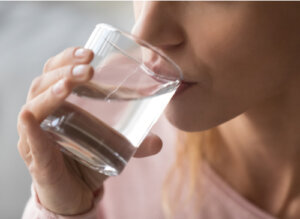
There are two opposing sides of the argument regarding whether it’s good to drink water while eating. It’s true that you can’t live without this liquid and that your body is made up mostly of water. However, people say that to drink water while eating can interfere with the digestion process. Find out the answer to this question in the following article.
Water, the essential liquid
Everyone knows about the benefits of water. Benefits such as eliminating toxins, hydrating organs, transporting minerals to the cells, and helping in all our body’s metabolic processes. That is why we recommend drinking between two and two and a half liters a day.
For a while now, the debate has raged regarding whether or not it’s good to drink water while eating. Does it help you lose weight? Does it change the digestive process? And does it make you retain more liquid? There are a lot of myths and preconceived ideas on this subject.
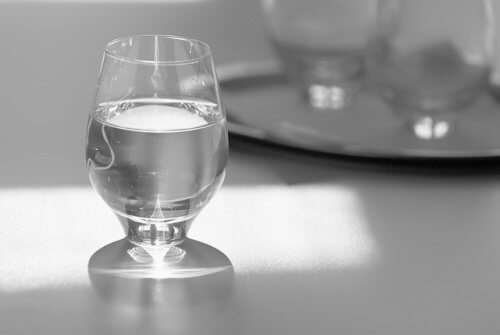
Firstly, water, when drunk alone, has no calories. If you drink water before lunch or dinner, your stomach will fill up. This make you eat less, but you won’t be losing weight because of that.
A study by the American Chemical Society of Boston stated that people who drank two glasses of water before their meal eat between 75 and 90 fewer calories. This is because water satiates our hunger. It is also sometimes because we think we’re hungry when really it is thirst.
Another belief is that if you drink water during meals, it will cause fluid retention. Experts say that this isn’t true, because quite the opposite happens. Drinking water stimulates kidney functioning. It helps balance water levels in the body, no matter what time it is or what you are doing.
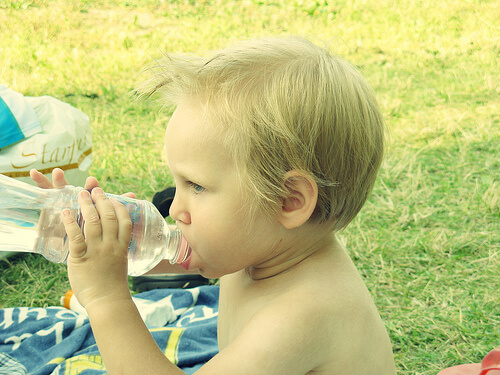
Some diets prohibit drinking water when you eat carbohydrates, because they say that this is because it makes food more difficult to digest. These guidelines should be followed with dishes that contain potatoes, bread, white rice, and potatoes. They insist that these foods get “bloated” with water, which is why they inflate your stomach and make you look fatter.
Questions and answers on the water-food relationship: another point of view
As we said at the beginning, there are people both in favor and against drinking water while eating. Those who are against it state that it is not beneficial because cold water solidifies oily material. This, in turn, interrupts or delays digestion.
What happens in your body when you drink water while eating?
When water (particularly cold water) dissolves and the intestines absorb it, it quickly turns into adipose tissue. This means that the foods turn into fat, and that goes directly to the arteries. If the fat stays there for some time, it can cause cholesterol or cardiac problems.
See also:Five Key Ways to Control Cholesterol
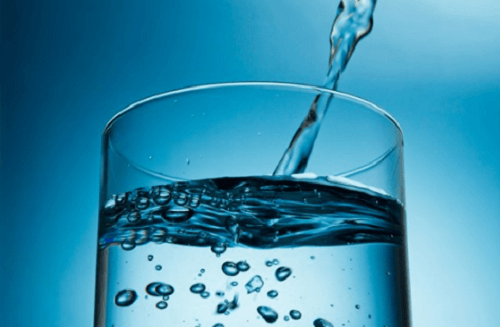
What reaction is triggered during the process?
Our stomachs produce acids that help to digest all our food. They ensure that each food item is properly assimilated. However, it all depends on the digestive system of each individual.
However, when you drink cold water, the acids slow down and are weakened, and it takes longer to break down food.
Is it better to drink water before or after eating?
We suggest that you don’t drink water while eating. It’s best to drink it afterwards, so that the liquid can protect the stomach walls. However, you should keep in mind that it’s better for the water to be at room temperature or warm, as opposed to water that was recently in the refrigerator or which has ice.
Cold water raises the body’s pH (which makes it more alkaline), and this is why it it makes the gastric process more difficult.
Does the same thing happen if I drink juice or soft drinks instead of water?
In these cases, both drinks perform a more radical function in the stomach because the gastric juices dilute them and also alter the digestive process. Therefore, we don’t recommend drinking non-natural fruit juices or soft drinks, neither before, during, nor after the meal. The truth is that it’s best to eat without drinking any liquids.
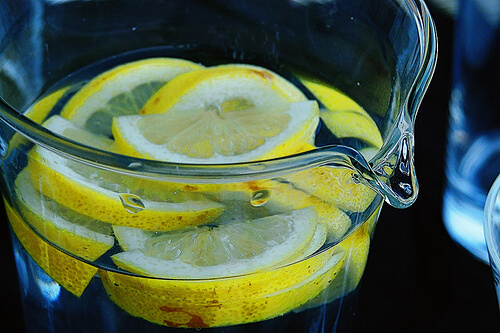
When and how to drink water?
The recommended amount is eight glasses minimum during the day outside of the three main meals (breakfast, lunch, and dinner). At night, it’s a good idea to drink two or three glasses of water in an hour, and then wait 30 minutes before you have your dinner. During the day, we recommend drinking water every thirty minutes, especially in the summer, whether you are thirsty or not.
The debate on whether it’s a good idea to drink water while eating or not continues. There isn’t much research that supports one theory or the other. So, basically, it all depends on your body and how you feel. If you drink water while eating and you feel more bloated, even though your meal has been light, it may be a good idea to change your habits.
If, in turn, you don’t drink anything and you realize that your body is taking longer to digest the food, then a glass of water after a meal is not a bad idea at all.
Some people recommend eating dessert before your main meal. Obviously, eating fruit like a pear or orange an hour before lunch or dinner will take away your appetite somewhat. You will also be well hydrated because of the fruit’s water content.
And so, we hope this article has helped you decide whether or not it’s good to drink water while eating, and, above all, what is best for your body!
This text is provided for informational purposes only and does not replace consultation with a professional. If in doubt, consult your specialist.








